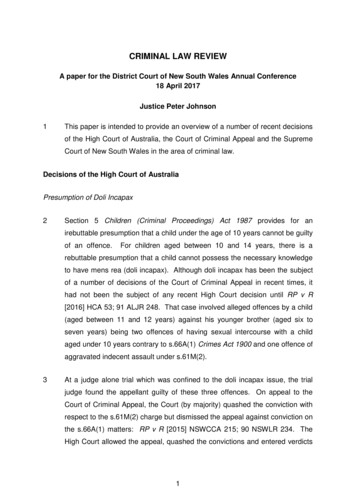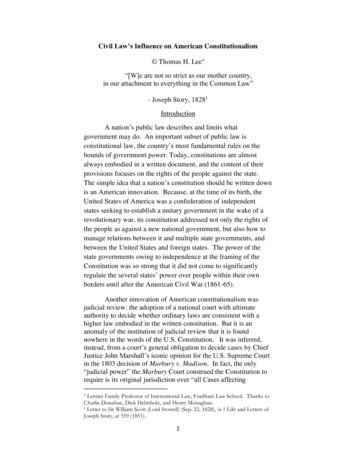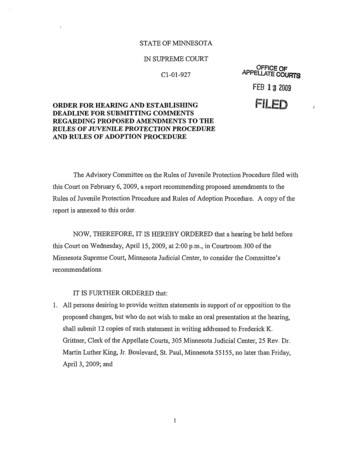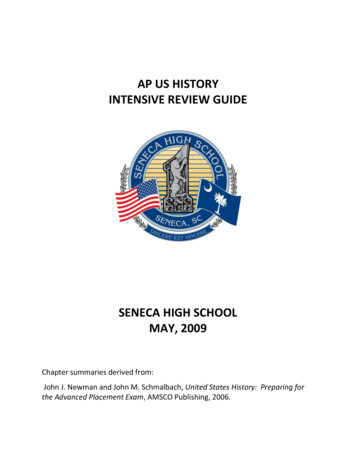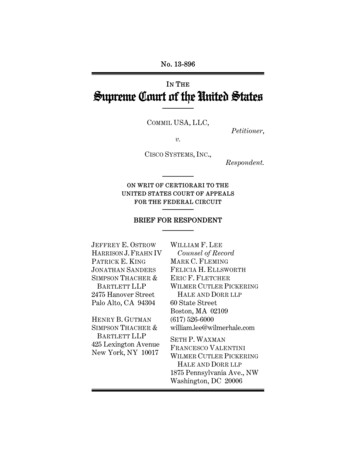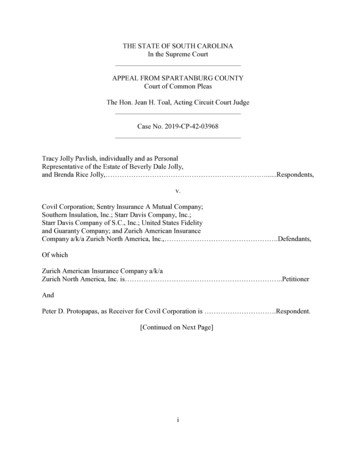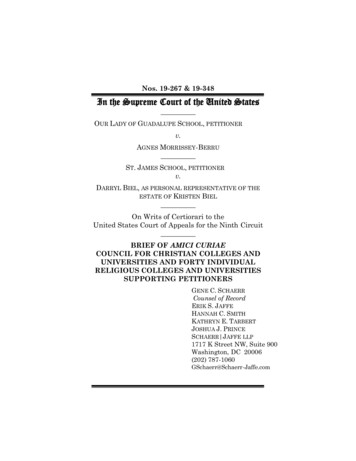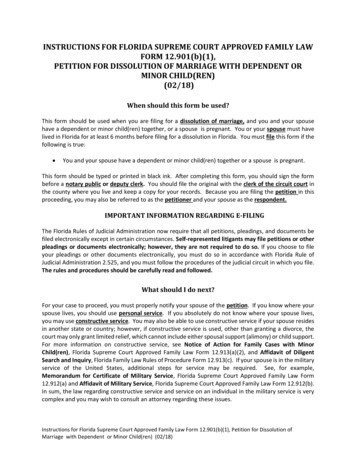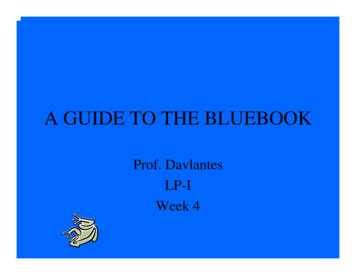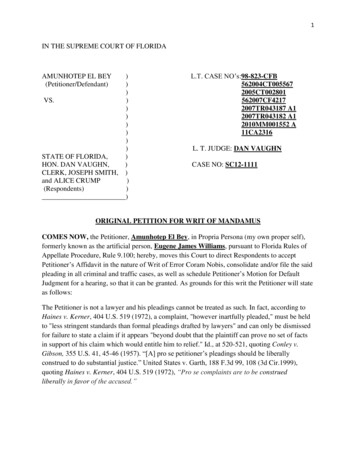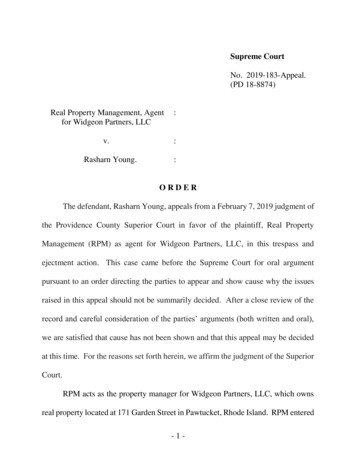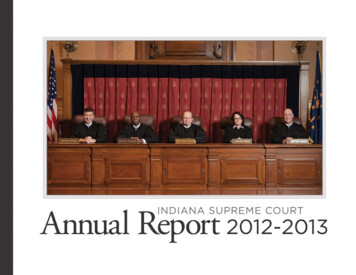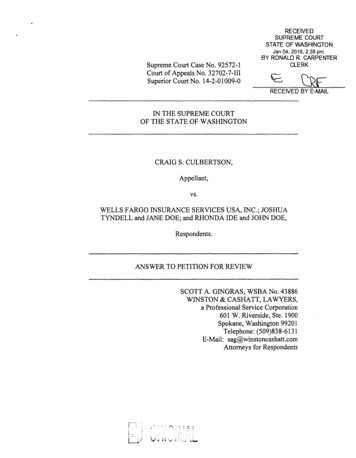
Transcription
RECEIVEDSUPREME COURTSTATE OF WASHINGTONJan 04, 2016, 2:38pmSupreme Court Case No. 92572-1Court of Appeals No. 32702-7-IIISuperior Court No. 14-2-01009-0BY RONALD R. CARPENTERCLERKRECEIVED BY E-MAILIN THE SUPREME COURTOF THE STATE OF WASHINGTONCRAIG S. CULBERTSON,Appellant,vs.WELLS FARGO INSURANCE SERVICES USA, INC.; JOSHUATYNDELL and JANE DOE; and RHONDA IDE and JOHN DOE,Respondents.ANSWER TO PETITION FOR REVIEWSCOTT A. GINGRAS, WSBA No. 43886WINSTON & CASHATT, LA WYERS,a Professional Service Corporation601 W. Riverside, Ste. 1900Spokane, Washington 99201Telephone: (509)838-6131E-Mail: sag@winstoncashatt.comAttorneys for Respondents
TABLE OF CONTENTSPageA.IDENTITY OF RESPONDENTS.B.ISSUES PRESENTED BY PETITION FOR REVIEW.C.STATEMENT OF CASE.D.1.Culbertson's initial at-will employ by Wells Fargo.2.The Wells Fargo Team Member Handbooks.23.Wells Fargo's compensation plans.34.Culbertson's termination.65.The companion case not on Appeal.6THE PETITION FOR REVIEW SHOULD BE DENIED.1.2.3.E.18The decision that the Wells Fargo Handbook did notcontain promises of specific treatment does notconflict with Swanson or Korslund.8The decision that Wells Fargo properly unilaterallymodified Culbertson's at-will compensation 1s mharmony with Washington law.12The Court of Appeals' refusal to apply judicialestoppel is not m conflict with any existingWashington case.1720CONCLUSION.-i-
TABLE OF AUTHORITIESPageCasesDuncan v. Alaska USA Fed. Credit Union, Inc.,148 Wn.App. 52, 199 P.3d 991 (2008)13,14,16Ebling v. Gove's Cove, Inc.,34 Wn.App. 495, 663 P.2d 132 (1983)15-17,20Flower v. TRA Industries, Inc.,127 Wn.App. 13, Ill P.3d 1192 (2005)15,17,20Garrett v. Morgan,127 Wn.App. 375, 112 P.3d 531 (2005)overruled on other gmds., 160 Wn.2d 535 (2007)18Govier v. North Sound Bank,91 Wn.App. 493,957 P.2d 811 (1998)13Korslund v. DynCorp Tri-Cities Servs.,156 Wn.2d 168, 125 P.3d 119 (2005)8,9,11,12Labriola v. Pollard Group. Inc.,152 Wn.2d 828, 100 P.3d 791 (2004)18Miller v. Campbell,164 Wn.2d 529, 192 P.3d 353 (2008)18Nelson v. Southland Corp.,78 Wn.App. 25, 894 P.2d 1385 (1995)10Quedado v. Boeing Co.,168 Wn.App. 363,276 P.3d 365 (2012)Stewart v. Chevron Chemical Company,111 Wn.2d 609, 762 P.2d 1143 (1988)- 11 -10,1211
Swanson v. Liquid Air Corp.,118 Wn.2d 512, 826 P.2d 664 (1992)Thompson v. St. Regis Paper Co.,102 Wn.2d 219,685 P.2d 1081 (1984)Warner v. Channell Chemical Co.,121 Wash237,208P.1104(1922)passim12,14,1715,17Rules and Statutes8,20RAP 13.4(b)12RAP 13.4(b)(1) or (2)- iii -
A.IDENTITY OF RESPONDENTS.The Respondents are Wells Fargo Insurance Services USA, Inc.,("Wells Fargo") and Joshua Tyndell ("Tyndell") 1 B.ISSUES PRESENTED BY PETITION FOR REVIEW.1.Does the decision that the Wells Fargo Handbook, as amatter of law, did not contain any promises of specific treatment mspecific circumstances conflict with existing Washington law?2.Does the decision that Wells Fargo unilaterally modifiedCulbertson's at-will compensation terms as a matter of law conflict withexisting Washington law?3.Does the decision not to apply judicial estoppel againstWells Fargo conflict with existing Washington law?C.STATEMENT OF CASE.1.Culbertson's initial at-will employ by Wells Fargo.On October 17, 2006, Wells Fargo offered employment toCulbertson through a written offer letter.(CP 9, 561-562) The letterlisted Culbertson's starting compensation, and specified that employmentwith Wells Fargo would be at all times "at-will," meaning that it had "nospecified term or length," and that both parties had "the right to terminate[Culbertson's] employment at any time, with or without advance noticeand with or without cause." (CP 561-562) No employee of Wells Fargo1Claims against fonner defendants Ms. Rhonda Ide and John Doe were dismissed withprejudice and not appealed, and they are not Respondents to the Petition. (CP 423-425)- 1-
had the authority to alter the at-will status, and employment wascontingent upon execution of a non-compete agreement.(CP 562)Culbertson signed the offer letter and the non-compete agreement, andbegan his employ with Wells Fargo. (CP 9, 555-559, 562, 578)2.The Wells Fargo Team Member Handbooks.At the start of his employment, Culbertson read a hard copy and anelectronic copy of the Wells Fargo Handbook effective at that time, datedJanuary I, 2006 (the "2006 Handbook"). (CP 9, 429) The cover page ofthe 2006 Handbook stated it was "updated online on an ongoing basis,"and provided a conspicuous disclaimer that the Handbook was "not acontract of employee 'rights,"' and that "employment at Wells Fargo is onan 'at-will' basis." (CP 585, 591) It further specified:[t]his Handbook is not a contract of employment. Youremployment with a Wells Fargo company has no specified term orlength; both you and Wells Fargo have the right to terminateyour employment at any time, with or without advance noticeand with or without cause. This is called 11 employment at will. 11(CP 600, emphasis added) In a chapter entitled "Leaving Wells Fargo," itagain stated that employment was "at-will," and declared that theHandbook was not a contract of employment. (CP 686)The version of the Handbook effective at the time of Culbertson'stermination was dated January 2014 ("2014 Handbook"). (CP 9, 429, 7341004) Culbertson and Wells Fargo agree that the 2014 Handbook contain- 2-
essentially the same language as the 2006 versiOn regarding at-willemployment status. See, CP 73 7, 823.In the 2014 Handbook, Wells Fargo once more made it clear that itretained the discretion to terminate its employees' at-will, with or withoutnotice, cause, performance counseling, or corrective action:[i]n most cases, if you have a performance issue, your managerwill work with you to provide the appropriate performancecounseling and corrective action so that you have the opportunityto improve. . . However, the policy is not progressive. Thismeans that your manager reserves the right to use any part of theprocess that he or she feels is appropriate for the situation - and, ifnecessary, to terminate employment without implementingperformance counseling and corrective action. This is consistentwith our "employment at will" policy.(CP 879, emphasis original)Lastly, in the "Career, Performance & Problems Solving" chapterof the 2014 Handbook, Wells Fargo directly referred its employees back tothe at-will policy, and stated that it did not "alter or modify Wells' Fargo's'employment at will policy'." (CP 879, 882) The underlined/hyperlinkreference back to the at-will policy is also found in the provision of the2014 Handbook regarding "Immediate Termination." (CP 975)3.Wells Fargo's compensation plans.In December, 2009, Wells Fargo began the process of unilaterallymodifying the terms of Culbertson's compensation. (CP 9, 430, 534-535,542-546, 1005-1012) Around that same time, Wells Fargo also rolled-out-3-
a new non-compete agreement to supersede its earlier version (the "20 10TSA"). (CP 534-535, 547-549, 566-568)On or about December 22, 2009, Culbertson received a packet ofdocuments containing: (1) a copy of "Wells Fargo Insurance ServicesUSA, Inc. Producer Plan, effective January 1, 2010" (comp plan);(2) Culbertson's "Appendix A2" to the January 1, 2010 Producer Plan; and(3) a copy of the new 2010 TSA 3. (CP 534-535, 542-549, 565-568)The January 1, 2010 Producer Plan stated that it superseded anyprevious agreement regarding employee compensation, and set forth howcommissions where going to paid, including how they would be paid toemployees who were terminated. (CP 542-544, 1005-1 007) Appendix Ato the Producer Plan stated the provisions of the comp plan would applyand the employee would be paid in accordance with the terms even if theemployee did not sign it. (CP 9, 565)Appendix A also gave Culbertson notice that Wells Fargo wasoffering a new and additional consideration, for one year only, for those2Throughout the litigation Culbertson has misrepresented the one-page "Appendix A" asthe entire comp plan; however, as recognized by the Trial Court and the Court ofAppeals, the entire plan, including the Appendix A, is six pages total, and containsmultiple terms ignored by Culbertson. (CP 542-546, 565, l 005-l 0 ll)3The extent of the Producer Plan and TSA documents, how Culbertson received them,and the words used in distributing them, were not material or relevant to Wells Fargo'sMotion for Partial Summary Judgment.- 4-
Wells Fargo employees who entered into the new 2010 TSA. (CP 565)The 2010 TSA also stated in it the additional consideration. (CP 566) OnJanuary 5, 2010, Culbertson executed the 2010 TSA, and following the2010 year, he was paid the additional consideration for entering into thenew non-compete agreement. (CP 116-117, 293, 508, 568)After the roll-out of the 2010 comp plan, Wells Fargo unilaterallymodified the comp plans (known as "WFIS Sales Incentive Plan" in laterversions) on approximately a yearly basis; the version in effect at the timeof Culbertson's termination was April1, 2013. (CP 430-431, 1013-1028)Culbertson received actual notice of the unilateral modification forthe April 1, 2013 compensation plan via an e-mail sent on December 31,2012, from the Executive Vice President and Head of Insurance Brokerageand Consulting for Wells Fargo. (CP 431-432, 1029-1031) Culbertsonacknowledged and responded to that e-mail through his Wells Fargo worke-mail. (CP 432, 1032, 1037-1039, 1072-1074)Culbertson's supervisor Tyndell also sent out an e-mail onOctober 29, 2013, to all Spokane sales executive employees, includingCulbertson, which provided an online link to the compensation plandocument, and instructed employees to "take time to review thisdocument." (CP 431, 1029) Culbertson received this notice of the 2013comp plan. (CP 432, 1029-1031, 1033)-5-
The April 1, 2013 comp plan specified in relevant part that: ( 1) itsuperseded any prior plan(s) or agreements regarding compensation; (2) itdid not create an employment contract, nor alter the at-will relationship;(3) it would be applied and the employee would be paid in accordancewith its terms even if the employee did not sign it; and (4) how/whencommissions were paid if an employee was terminated. (CP 1022-1027)4.Culbertson's termination.On February 3, 2014, Culbertson's employment was terminated byWells Fargo for falsification of company records. 4 (CP 10, 28) AfterCulbertson's termination, Culbertson's post-termination compensation waspaid by Wells Fargo pursuant to the 2013 comp plan. (CP 432-433, 518519,526-527,529-531, 550-551)5.The companion case not on Appeal.Contemporaneous to the filing of the Complaint by Culbertson,Wells Fargo filed a separate lawsuit against Culbertson, seeking in part toenforce the 2010 TSA. (CP 109-131) In that case, Culbertson alleged asone of his defenses that the 201 0 TSA was not valid and enforceableagainst him for lack of independent consideration. (CP 513)4Culbertson judicially admitted that his employment with Wells Fargo was at all times"at-will;" therefore, it is irrelevant whether Culbertson's termination was with or withoutcause, and with or without advance notice. (CP 506)- 6-
Wells Fargo filed a Motion for Partial Summary Judgment in thatcase, which was granted; the trial court ruled that as a matter of law the201 0 TSA Culbertson signed was valid and supported by independentconsideration. (CP 295, 299-3o'3)In that case, Wells Fargo never contended that the 2010 ProducerPlan was limited to the one page Appendix A; that Culbertson's signatureon Appendix A was relevant to the determination of the validity of the2010 TSA; nor that the 2010 Producer Plan and Appendix A was an"exchange of promises" or a "bilateral contract," not subject to unilateralmodification by Wells Fargo. The exchange of consideration related solelyto the 2010 TSA. (CP 239-240)In its briefing, Wells Fargo argued plainly that "Culbertsonaccepted the additional 1% commissions when he signed the 201 0 TSA,and thereafter received the additional 1% commissions.These factsestablish the appropriate additional consideration independent of WellsFargo's previous agreements with Culbertson, and satisfy Washington lawrendering the 2010 TSA enforceable." (CP 251) All references to "it" andthe "new agreement" made by Wells Fargo in that case concerned the201 0 TSA, and not the Producer Plan and Appendix A.In oral argument, Wells Fargo also made clear that Appendix Awas simply notice of the additional consideration for the 2010 TSA:- 7-
Again, Appendix A is to the comp plan, and it says in there it'sgiving him notice that purchaser will receive the followingconsideration for signing the new TSA. One percent on newrevenue and additional one percent on net new revenue. He's notgetting that for signing the comp plan or Appendix A.(RP 5-6, 11, CP 277-278, 283) (emphasis added)D.THE PETITION FOR REVIEW SHOULD BE DENIED.The decision of the Court of Appeals affirming summary dismissalof Culbertson's claims is not in conflict with existing Washington law, andinvolves no issues of substantial public interest; therefore, review shouldbe denied. See, RAP 13.4(b).1.The decision that the Wells Fargo Handbook did notcontain promises of specific treatment does not conflictwith Swanson or Korslund.The unanimous Division III decision that the Wells FargoHandbook did not, as a matter of law, provide promises of specifictreatment in specific circumstances, is not at odds with either of the factspecific Washington Supreme Court cases Swanson v. Liquid Air Corp.,118 Wn.2d 512, 826 P.2d 664 (1992), or Korslund v. DynCorp Tri-CitiesServs., 156 Wn.2d 168, 125 P.3d 119 (2005).Both Swanson andKorslund acknowledge that it is proper for a trial court to decide thepertinent issues as a matter of law on summary judgment. Korslund, 156Wn.2d at 185; Swanson, 118 Wn.2d at 522. Examination of the record- 8-
here and the rulings in both Swanson and Korslund illustrate thatCulbertson's reliance on those two cases is wrong.First, Swanson involved an issue between two contradictorywritten employment materials. The first was an existing employee manualwhich stated that the employees' employment was at-will, and contained adisclaimer. The second was a later drafted "Memorandum of WorkingConditions," which stated that in certain circumstances "at least onewarning shall be given" prior to termination. Swanson, 118 Wn.2d at 516(emphasis added). The Memorandum did not contain a disclaimer, at-willlanguage, or provide any discretion to the employer in applying the policy.The court in Swanson held that because the two documents wereinconsistent, and the Memorandum was drafted after the employmentmanual, genuine issues of material fact existed as to whether the employermade a promise of specific treatment in specific circumstances when itwrote that it "shall" not discharge plaintiff without at least one priorwarning. Swanson, 118 Wn.2d at 519. Because of the inconsistency, thecourt also concluded that the effect of the employer's disclaimer was anissue to be determined by the trier of fact. Id.Here, unlike Swanson, there is only one written document onwhich Culbertson relies for his claim: the Handbook, which does not anycontain contradictory or inconsistent language with respect to terminating- 9-
Culbertson's at-will employment. Nowhere in the Handbook does it statethat Wells Fargo "shall," "will," or "must" do (or not do) anything nfact,directlydistinguishable from Swanson, the statements that Culbertson relies uponestablish Wells Fargo's discretion, and reinforces the at-will relationship.And, the most significant distinguishable fact from Swanson is thatthere is a conspicuous disclaimer contained in Wells Fargo's Handbook.A conspicuous disclaimer that is effectively communicated to theemployee, which is not negated by later inconsistent representations, candisclaim as a matter of law what might otherwise appear to be enforceablepromises in handbooks or similar documents. Quedado v. Boeing Co.,168 Wn.App. 363, 374, 276 P.3d 365 (2012) [citing Swanson].TheSwanson court recognized, as Division III found here, that "in somecircumstances it may be possible to determine the effect of a disclaimer asa matter of law."Swanson, 118 Wn.2d at 528; see also, Nelson v.Southland Corp., 78 Wn.App. 25, 33, 894 P.2d 1385 (1995) ("[a]s a matterof law, by including the disclaimers within the very policies andprocedures at issue, Southland provided Mrs. Nelson with reasonablenotice it did not intend to be bound by them. In addition, the disclaimerswere effective as a matter of law."). Therefore, the decision is not inconflict with the fact-specific holding of Swanson.- 10-
Similarly, the undisputed facts in this case are drastically differentthan those in Korslund. Korslund involved three employees who reportedsafety violations, mismanagement, and fraud, who then alleged retaliationby their supervisors; those supervisors were never disciplined, despite apolicy requiring such discipline.Because the employer had a policy that mandated nondiscretionary disciplinary action in that specific circumstance, the courtheld that there was an issue of fact whether the employer made promisesof specific treatment.The court distinguished its facts with those ofStewart v. Chevron Chemical Company, Ill Wn.2d 609, 762 P.2d 1143(1988), in which the court held that a termination policy stating thatmanagement "should" consider certain factors in layoff decisions was tooindefinite to create an obligation.Korslund, 156 Wn.2d at 190.Furthermore, there was no discussion in Korslund concerning anyconspicuous disclaimers in the employer's policy documents.As a result, the facts of Korslund, like Swanson, are directlyopposite to the facts and relevant language of the Wells Fargo Handbook;Wells Fargo always retained the ultimate discretion on terminatingemployees, and applying its policies, and the Handbook did not have anymandatory language. See the Decision, pg. 8.- 11 -
Lastly, Culbertson contends that the decision is in error because itfailed to cite to any of the general policy language that Culbertson believescontains specific promises of specific treatment. However, the decisiondid not have to burdensomely recite to general non-binding Handbooklanguage because such language is exactly the type that Washington courtsfind to be general policy statements that are not binding on an employerand do not create a claim. See .Quedado, 168 Wn.App at 370-71[citing Thompson v. St. Regis Paper Co., 102 Wn.2d 219, 229-231, 685P.2d 1081 (1984)]. Even Swanson and Korslund acknowledge theWashington legal principal that "general statements of company policy donot constitute promises of specific treatment in specific situations."Korslund, 156 Wn.2d at 190; Swanson 118 Wn.2d at 521-522.Here, the Handbook's general and discretionary policy statementsare not enough to survive summary judgment, and the decision was not inconflict with any existing law as required under RAP 13 .4(b )(1) or (2).2.The decision that Wells Fargo properly unilaterallymodified Culbertson's at-will compensation is inharmony with Washington law.The Court of Appeals properly, and m accord with existingWashingtonlaw,affirmedthesummary judgment dismissalofCulbertson's breach of contract and corresponding wage claims.Nonetheless Culbertson ignores undisputed facts regarding Wells Fargo's- 12-
unilateral modification of Culbertson's at-will employment compensationterms, and the circumstances of Culbertson's execution of the 201 0 TSA toclaim that his signature on "Appendix A" to the January 1, 2010, andOctober 1, 2011 comp plans, somehow created bilateral contractsregarding the terms of his compensation, which could not thereafter beunilaterally modified.However, in applying relevant Washington law to the undisputedfacts, such as Duncan v. Alaska USA Fed. Credit Union, Inc., 148Wn.App. 52, 199 P.3d 991 (2008), the Court of Appeals correctly came tothe conclusion that: "the at-will employment relationship still permittedWells Fargo to unilaterally change the terms of employment," and thatWells Fargo made all payments owing under the 2013 comp plan. See theDecision, pgs. 9, 11.Culbertson claims that the Court of Appeals improperly used theDuncan case to support its holding. However, Duncan stands for the wellestablished law that an at-will employee's employment terms andconditions, including compensation, can be unilaterally modified by theemployer at any time during the employment relationship with reasonablenotice to the employee. Duncan, 148 Wn.App. at 73; see also, Govier v.North Sound Bank, 91 Wn.App. 493, 494, 957 P.2d 811 (1998).- 13-
This principal was initially articulated in Thompson v. St. RegisPaper Co., 102 Wn.2d 219, 229, 685 P.2d 1081 (1984), in which theSupreme Court declared as a "rule" that in an at-will employmentrelationship, an employer can modify the terms of compensation withreasonable notice, and an employee must either accept the changes, quit,or be discharged. Thompson, 102 Wn.2d at 229.In Duncan, the court affirmed the Thompson rule and held that theemployee's compensation "agreement was properly modified because theagreement was a unilateral contract, which was terminable at-will."Duncan, 148 Wn.App. at 78.Here, just like Duncan, it is factuallyundisputed that: (i) Culbertson was at all times at-will; (ii) Wells Fargomodified Culbertson's compensation terms; (iii) Culbertson receivedactual notice of the modification; and (iv) Culbertson has been paid allamounts due under the modification.Furthermore, just as with the facts of Duncan, here there is no"evidence any exchange [of] reciprocal promises, a requirement for abilateral contract." Duncan, 148 Wn.App. at 74. Culbertson's signatureson Appendix A to the compensation plans in 2009, and in 2011, did notcreate bilateral contracts on compensation terms, and did not precludefuture modifications by Wells Fargo upon reasonable notice. Even thecompensationplandocumentsthat- 14-Culbersonsigneddirectly
acknowledged those facts: "[t]he provisions of the WFIS Producer Planwill be applied and the Participant will be paid in accordance with theterms even if the Participant does not sign Appendix A." (CP 9, 565, 570)Moreover, Culbertson is incorrect that the decision is in conflictwith three cases: Flower v. TRA Industries, Inc., 127 Wn.App. 13, 111P.3d 1192 (2005), Ebling v. Gove's Cove, Inc., 34 Wn.App. 495, 663 P.2d132 (1983), and Warner v. Channell Chemical Co., 121 Wash 237,208 P.11 04 (1922).First, Flower involved a plaintiff who promised to accept an offerof employment, sell his home in another city and relocate, but only if hisemployer promised to terminate him only for-cause; based on those veryspecific facts, the court concluded that the exchange of these promisesconstituted a bilateral employment contract. Because the parties made theoriginal mutually binding exchange of promises, the court found that alater attempt by the employer to change the employment structure to an atwill relationship did not rescind the employer's obligation to terminateonly for-cause.Culbertson'sThis case holding has absolutely no bearing dification of its compensation terms by Wells Fargo.Similarly, Ebling concerned an employer who promised to pay anemployee a specific commission percentage, but only if the employee- 15 -
accepted a transfer to manage a different office; the employee acceptedand the employer thereafter attempted to unilaterally modify to reduce theagreed-upon commission rate. Ebling, 34 Wn.App. at 497. The courtfound that the agreement for the employee to transfer positions in returnfor a specific commission rate was a bilateral contract. Id. at 498-99.In stark contrast with the facts of these cases, there was never abilateral employment contract created between Wells Fargo andCulbertson regarding the terms of his employment, including hiscompensation. Regardless, as the decision noted, "even if the parties in201 0 had a bilateral compensation agreement, the continued existence ofthe at-will employment relationship still permitted Wells Fargo tounilaterally change the terms of employment." See the Decision, p. 11.Furthermore, Ebling was specifically distinguished in Duncanbecause of the at-will nature of the employment agreement:[s]ignificantly, the court [in Ebling] did not address the question ofunilateral contracts that are terminable at will. Nowhere in thatopinion is there any indication that the question was even argued.Rather, the employer in that case unsuccessfully argued that Eblingwas an independent contractor. In short, that court's conclusionthat there was a bilateral contract, without more, does not affectour determination here that the 2003 agreement between theseparties was a unilateral contract.Duncan, 148 Wn.App. at 75.- 16-
Finally, the decision does not effectively overrule the Warner caseas Culbertson contends. That is because Warner, like Flower, did notinvolve the unilateral modification of an at-will employee's compensationterms. Instead Warner, (from the year 1922, which pre-dates Thompsonand its progeny), involved a specific employment contract whereby theemployer employed a salesman for a specific period of time (duration), forspecific commission rates, and the contract had express terms andconditions on why and how it could be terminated.Those facts arecompletely different than the facts of our case.Thus, Flower, Ebling and Warner create no precedent here, and donot conflict with the decision of this at-will employment case.3.The Court of Appeals' refusal to apply judicial estoppelis not in conflict with any existing Washington case.Culbertson has unsuccessfully argued, at both the trial court andappellate levels, that Wells Fargo should be judicially estopped fromenforcing the 2013 compensation plan, because Wells Fargo arguedsuccessfully in its own suit against Culbertson that the 2010 TSA wasvalid and enforceable based upon the independent consideration it paid toCulbertson for executing the 2010 TSA. However, the Court of Appealscorrectly recognized that there was "nothing in the arguments to JudgePlese indicating that Wells Fargo contended Culbertson's future- 17-
compensation was governed by the new TSA agreement," and "there is nobasis for applying judicial estoppel." See the Decision, pp. 10, 11.Judicial estoppel applies only when there is an inconsistency in thepositions taken by a party, there is a perception a court has been misled,and one party will obtain an unfair advantage from the inconsistentposition it has taken. Miller v. Campbell, 164 Wn.2d 529, 539, 192 P.3d353 (2008). Judicial estoppel is inapplicable when the party can explainthe differences in the two positions. Garrett v. Morgan, 127 Wn.App. 375,112 P.3d 531 (2005) overruled on other gmds., 160 Wn.2d 535 (2007).Here, Wells Fargo's positions in the two cases were notinconsistent, because the issues are not identical. Wells Fargo's statementsin its own suit dealt with the separate law regarding the independentconsideration necessary for the enforcement 20 I 0 TSA, which was simplynoted in Appendix A, versus the entirety of 2013 comp plan in effect atCulbertson's termination.Culbertson recognizes that a non-compete agreement can only beenforced against a current employeeif the employee receives"independent" consideration, in addition to continued employment. See,Labriola v. Pollard Group, Inc., 152 Wn.2d 828, 834, 100 P.3d 791(2004). In the action before Judge Plese, Wells Fargo moved for, andobtained a ruling that as a matter of law, the 2010 TSA Culbertson signed- 18 -
on January 5, 2010 was supported by the independent consideration of anincreased commission for the year 2010. The sole issue before JudgePlese was whether Culbertson, by signing the 2010 TSA (not Appendix A)on January 5, 2010, and thereafter being paid the increased commissionconsideration, created a valid and enforceable non-compete clause. JudgePlese found that it did. Judge Plese did not have before her the issue ofthe existence of a "bilateral contract" which precluded Wells Fargo fromaltering any other terms of Culbertson's employment or compensation.At no time did Wells Fargo ever contend in either case that WellsFargo made an exchange of promises or a bilateral contract in the 2010Producer Plan and Appendix A, to form an agreement providing theindependent consideration to support the restrictive covenants in the 2010TSA. At no time in the separate litigation before Judge Plese did WellsFargo assert that every unilateral change to Culbertson's employmentterms had to be mutually negotiated and that he had to "accept" them via asigned document. Wells Fargo never took the position that the 2010 SalesIncentive Plan was limited to Appendix A which Culbertson signed onDecember 22, 2009, nor was his signature on that document relevant to theultimate determination ofthe validity of the 2010 TSA.Moreover, the record establishes that Wells Fargo and its Counselargued different law applying to different facts, and apprised both courts- 19-
of the relevant issues in the separate actions. At no time was either court"misled" by Wells Fargo in its statements regarding either the comp plansor the non-compete agreement, and there was no "unfair advantage," asnecessary to the policy behind judicial estoppel to apply.Lastly, on this issue Culbertson once more merely re-cites to theinapplicable Flower and Ebling cases to support his basis for review, butas already discussed, these cases on bilateral employment contracts arecompletely irrelevant to the sole issues before the trial court here ofwhether Wells Fargo could unilaterally modify Culbertson's at-willemployment compensation terms, and whether Culbertson got reasonablenotice of the modification; and the sole issue before Judge Plese ofwhether the non-compete agreement was supported by necessaryindependent consideration t
The decision that the Wells Fargo Handbook did not contain promises of specific treatment does not 2 3 6 6 8 conflict with Swanson or Korslund. 8 2. The decision that Wells Fargo properly
